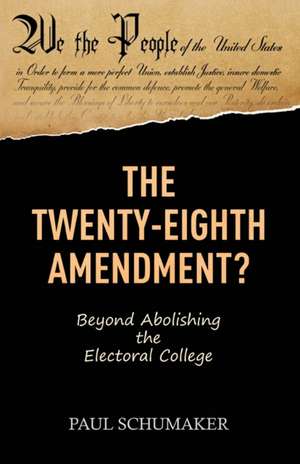The Twenty-Eighth Amendment?
Autor Paul Schumakeren Limba Engleză Paperback – 16 feb 2020
Preț: 108.27 lei
Nou
Puncte Express: 162
Preț estimativ în valută:
20.72€ • 21.55$ • 17.11£
20.72€ • 21.55$ • 17.11£
Carte tipărită la comandă
Livrare economică 14-28 aprilie
Preluare comenzi: 021 569.72.76
Specificații
ISBN-13: 9781642378733
ISBN-10: 1642378739
Pagini: 280
Dimensiuni: 140 x 216 x 15 mm
Greutate: 0.33 kg
Editura: Gatekeeper Press
ISBN-10: 1642378739
Pagini: 280
Dimensiuni: 140 x 216 x 15 mm
Greutate: 0.33 kg
Editura: Gatekeeper Press
Notă biografică
Until his retirement in 2017, Paul Schumaker was a professor of political science at the University of Kansas for 45 years. After graduating Phi Beta Kappa from Beloit College, where he co-majored in economics and philosophy, he earned his PhD in political science at the University of Wisconsin-Madison. At KU, he taught a wide variety of courses, not only in political science and political theory but in Western Civilization. His teaching and research focused on empirical political theories, seeking to provide political explanations and evaluations from a variety of political and moral perspectives. Overtime, he focused increasingly on developing democratic pluralism as a primary basis for understanding and achieving democratic processes and effective and fair outcomes in American national, state, and local politics. His contributions to "Advancing Pluralism" are available at https://paulschumaker.com The diversity of his achievements is indicated by the many scholarly books and articles that are listed on his website and in his leadership positions at the University of Kansas (including serving twice as Chair of Political Science and Director of the Division of Government). During his career, he received awards for both his teaching and research, and some of his books and articles have been translated into foreign languages. While his journal articles are addressed to other professors in the academy, the audience of his books are as often students as professionals. The Twenty-Eight Amendment? is his first attempt to reach a broader public audience, and he employs a variety of literary techniques for this purpose He had given little attention to the Electoral College until the Bush-Gore presidential election in 2000, and since then his interest in the College was little more than a hobby until it put Donald Trump in the White House. During his retirement, he has become somewhat obsessed with understanding developments subsequent to the framing and adoption of the Constitution that have thwarted the framers intention to prevent the election of demagogues. Additionally, he has studied alternative methods for choosing a president that are more consistent with both the intentions of the framers and with contemporary democratic values. That Schumaker is not completely obsessed with politics and political theory generally, and with the Electoral College in particular, can be observed by reading some of his blogs at https://paulschumaker.com. He plays tennis and rides bikes regularly (but he stopped being a distance-runner almost a decade ago, and now plays golf only when he is willing to humiliate himself on the links). He enjoys many cultural and recreational activities with his wife (Lynn Burlingham whose writings are available at lynnburlingham.com). They enjoy visiting his sons and grandkids in California. They also enjoy taking other trips around the country and in various other parts of the world, often to see other members of their families and their many friends. They enjoy spending summers at their cabin at in northern Wisconsin, which is sometimes a gathering place for their families and friends. Proposing to amend the Constitution should not be construed as evidence that Schumaker is an unhappy man, upset with the overall Constitution, American government, or current political trends generally. On the contrary, he is grateful for the many blessings in his life. It's just that there are some problems in life that he believes can be lessened or remedied by reflections and commitments - sometimes through solo endeavors and sometimes working with others in our various communities. One such problem is how Americans choose their presidents. This book is his solo effort to think through that problem. But he recognizes that solving this problem will require a broad and probably sustained national effort.
